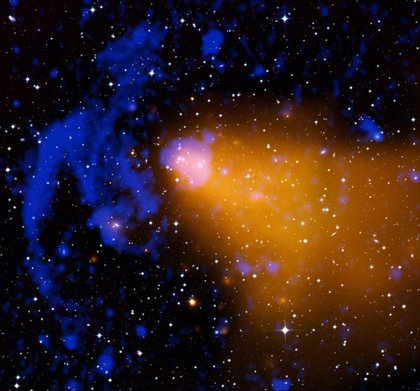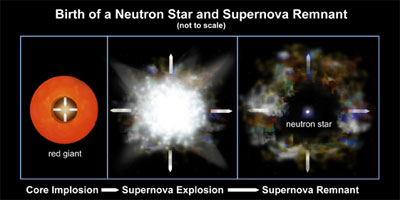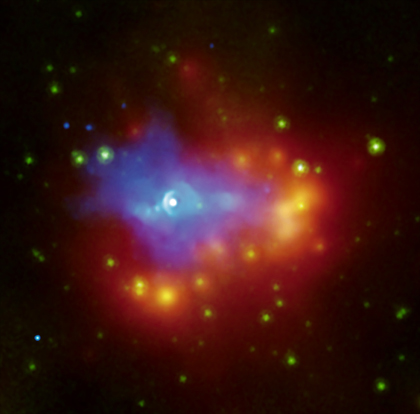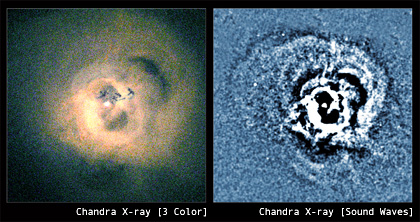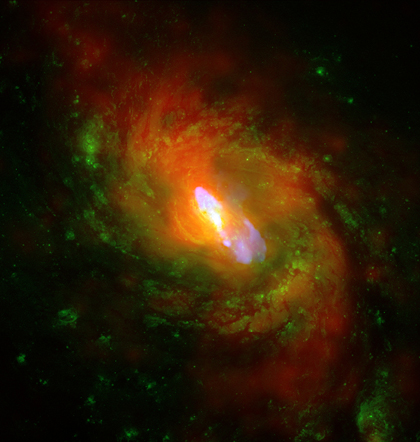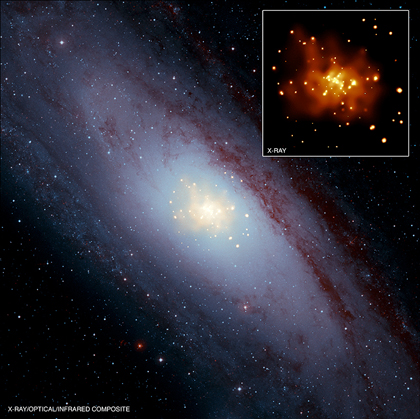Shapes All Over The Place: Bubbles
Maybe it's the large number of the pre-school people that we spend time with these days, but we see shapes all over the place. Hoping to go beyond the snack-and-nap crowd, we like to look for similar shapes in very unexpected places.

A demonstration of visuals for bubbles (soap bubble, bubble nebula, galaxy cluster bubbles) across different scales.
Webby Award To Chandra Trailer
Since the dawn of the Internet, there have been countless things that have come and gone. To some of them, we can easily say good riddance (flashing rainbow icons? the used-to-death phrase of the "information superhighway"?)

Einstein's Theory Fights off Challengers
Two different teams have reported using Chandra observations of galaxy clusters to study the properties of gravity on cosmic scales and test Einstein's theory of General Relativity. Such studies are crucial for understanding the evolution of the universe, both in the past and the future, and for probing the nature of dark energy, one of the biggest mysteries in science.
Q and A of the Day: Where The Supernovas Are
Q:
Where in a galaxy would you expect to find Type I and Type II supernovas?
A:
The two basic types of supernovas are Type Ia and Type II. Other types, such as Types Ib and Ic, are unusual supernovas that have most of the properties of type II supernovas.
Ashes to Ashes, Dust to Dust
A new image from NASA's Chandra X-ray Observatory and Spitzer Space Telescope shows the dusty remains of a collapsed star. The dust is flying past and engulfing a nearby family of stars. Scientists think the stars in the image are part of a stellar cluster in which the a supernova exploded. The material ejected in the explosion is now blowing past these stars at high velocities.
The Poetry of Discovery
Richard Dawkins, the Oxford zoologist and author, once said that "science is the poetry of reality", an observation that inspired a new video from the people who run the Symphony of Science project.
Another link can be made between science and poetry when scientific discoveries inspire people to write poems. Jonathan Taylor, a Senior Lecturer in Creative Writing at De Montfort University in the UK, wrote a poem about the deep note generated by a black hole in the Perseus galaxy cluster.
Jonathan is not only a poet, but a memoirist and novelist.
Winds of Change: How Black Holes May Shape Galaxies
This is a composite image of NGC 1068, one of the nearest and brightest galaxies containing a rapidly growing supermassive black hole. X-ray data from the Chandra X-ray Observatory are shown in red, optical data from the Hubble Space Telescope in green and radio data from the Very Large Array in blue. The spiral structure of NGC 1068 is shown by the X-ray and optical data, and a jet powered by the central supermassive black hole is shown by the radio data.
Q and A of the Day: How Have Telescopes Changed Things?
This set of queries came in from a couple of students, and we liked senior scientist Martin Elvis's responses so much that we thought we'd post them for everyone to see.
How do you feel the telescope has changed the scientific view on our universe?
Hugely! Before the telescope we thought the universe was big, but we really had no idea how big. Telescopes immediately showed us that there were vastly more stars out there than we had thought, but it took lots of work making bigger and better telescopes -- and learning how to use them. It took lots of work before we started to know how far away the stars were (using "parallax"), where we fit into the Milky Way, our galaxy (on the edge - dust in space hid our view so we thought we were in the middle), and the Milky Way into the scheme of all galaxies. It's a LONG story, and always our view widens, and is still widening. Now we can see back to when the galaxies were forming, but we have only just begun to find planets around other stars.
What Triggers Cosmology's Most Important Explosions?
The work by Gilfanov and Bogdan described in the recent Chandra Press release represents a major advance in understanding the origin of Type Ia supernovas. Here, in Q & A format, we give some of the backstory of this important discovery.
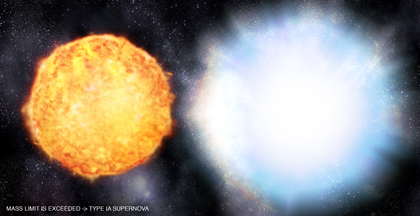
Illustration: NASA/CXC/M.Weiss
NASA's Chandra Reveals Origin of Key Cosmic Explosions
This composite image of M31 (also known as the Andromeda galaxy) shows X-ray data from NASA's Chandra X-ray Observatory in gold, optical data from the Digitized Sky Survey in light blue and infrared data from the Spitzer Space Telescope in red. The Chandra data covers only the central region of M31 as shown in the inset box for the image.

